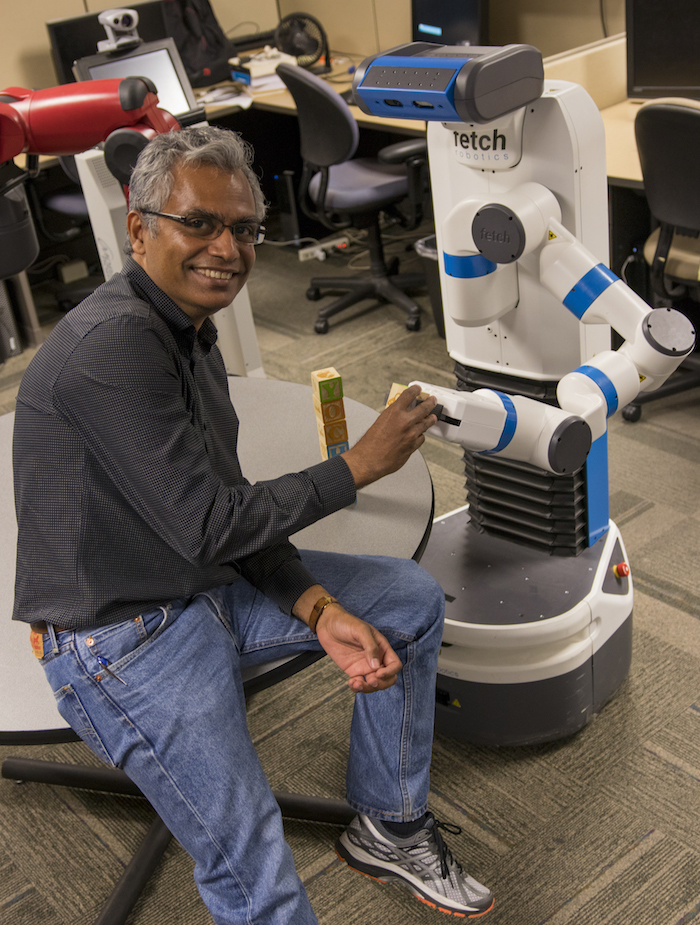Exemplary leadership, significant contributions earn ASU professors AAAS Fellow status

Professor Sethuraman Panchanathan oversees ASU’s $540-million-plus research enterprise and leads research aimed at developing computing technologies and human-centered computing applications. Photo courtesy of ASU/ Copyright 2017 Arizona Board of Regents.
Arizona State University Professors Sethuraman Panchanathan and Subbarao Kambhampati, from the Ira A. Fulton Schools of Engineering, are among the newest fellows of the world’s largest multidisciplinary science society, the American Association for the Advancement of Science.
The AAAS bestows the distinction of fellow in recognition of contributions to science, engineering and technological innovation, as well as leadership and outstanding achievements.
Panchanathan is the executive vice president of Knowledge Enterprise Development and chief research and innovation officer at Arizona State University.
In his current role, he oversees ASU’s $540-million-plus research enterprise and serves on several national research councils, including the National Science Board and the National Academy of Inventors.
He is the founder and director of the Fulton Schools’ Center for Cognitive Ubiquitous Computing and the Foundation Chair in Computing and Informatics.
Panchanathan’s research contributions are in the areas of human-centered multimedia computing, haptic user interfaces, person-centered tools and ubiquitous computing technologies for enhancing the quality of life of people with disabilities.
His work also includes machine learning for multimedia and ubiquitous computing applications.
His research has been supported by the National Science Foundation, the National Institutes of Health, Science Foundation Arizona, the Flinn Foundation, the Arizona Department of Economic Security and major technology industries.
Panchanathan says that as an AAAS Fellow he looks forward to contributing his scientific and leadership experience to envisioning scientific and engineering solutions that impact humanity, as well as promoting the importance of the work of scientists and engineers toward the advancement of research, industry, education, economic development and societal advancement.
Panchanathan and Kambhampati are longtime teachers of courses offered in the School of Computing, Informatics, and Decision Systems Engineering, one of the Fulton Schools.
Professor Subbarao Kamphampati is president of the Association for the Advancement of Artificial Intelligence. His research in that area focuses on automated planning, machine learning, robotics and design of human-aware artificial intelligence systems. Photo by: Marco-Alexis Chaira/ASU
Kambhampati is the president of the international Association for the Advancement of Artificial Intelligence and sits on the board of directors of the Partnership on Artificial Intelligence to Benefit People and Society, a nonprofit group of leaders in high-tech industries, at major research universities and private foundations.
His research focuses on artificial intelligence, specifically in the areas of automated planning, machine learning, robotics and design of human-aware artificial intelligence systems.
That work has attracted support from the National Science Foundation, the Defense Advanced Research Project Agency, NASA, the U.S. Air Force and the Office of Naval Research and Google, among others.
Selection as AAAS Fellows offers more than high-level recognition among professional peers, Kambhampati said.
The organization’s mission includes enhancing communications between scientists, engineers and the public, seeking to strengthen public support for research and technology enterprises and to “provide a voice for science on societal issues.”
The AAAS “clearly sees itself as an advocacy group, and it has been getting more involved in recent years in public debates and taking positions on issues that are in the news and that will affect us,” Kambhampati said.
His role as president of the artificial intelligence organization has already made him a frequent go-to source for journalists reporting on issues springing from rapid advances in AI technologies and their potential societal impacts.
There may now be more of an expectation from AAAS leadership that fellows actively engage in the organization’s advocacy efforts, he says.
Panchanathan and Kambhampati now join six other current Fulton Schools of Engineering faculty members as AAAS Fellows: Professors Brad Allenby, Jerry Lin, Deirdre Meldrum, Bruce Rittmann, Nongjian Tao and Stephen Yau.
More Science and technology

Study reveals genetic insight into desert survival
The deserts of the American Southwest are home to the Mojave and Sonoran desert tortoises, two seemingly similar yet genetically…

Study reveals lasting effects of common weed killer on brain health
Environmental exposure to toxins in the air, water or certain chemicals can increase the risk of ill health effects, including to…

ASU grad to use science to get an edge on crime
Editor’s note: This story is part of a series of profiles of notable fall 2024 graduates.As a child growing up in Pinetop,…
